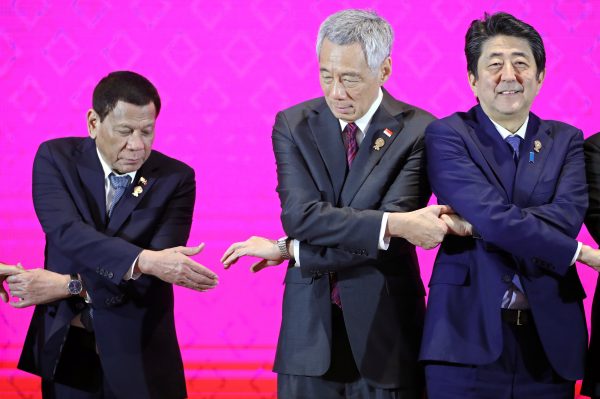After decades of bestsellers prematurely forecasting the division of the world economy into trading blocs, the stuck clock is finally close to right: there is and will be increasing pressure for multinational companies and third markets to line up with either Chinese or North American economic networks. Importantly, though, this will not be a matter of trade in and of itself. Alignment of and restrictions on cross-border investment — and the transfers of technology and human capital which accompany those investments — will generate this pressure.
It is the advanced rather than the middle and low-income economies that have greater diplomatic need and capacity to create a safe space for themselves to grow. The developing world will in turn be better served if there is more room created for non-politicised investment in their economies and competition in and for their markets.
More than any other economy except the European Union as a whole (when it is able to cohere), Japan has the potential to pursue its own independent relationships with third economies while maintaining economic ties with both China and the United States. The United States can trust Japan not to align with China on security issues and China can trust Japan not to forsake its market so long as Japan’s territorial security is not threatened.
Japan has so much to offer each competing power, from bases and direct support for the US military to critical technologies and enormous gains from trade for China. Japan also has much to lose if these relationships are severed. History and democratic values, as well as long-standing FDI, maintain the US–Japan bond, and economic gravity (size and proximity) as well as complementarities fuel China–Japan ties. Having a less divided polity than the United States and a far freer society than China, gives Japan considerable independence in economic diplomacy.
What should Japan try to achieve in the economic sphere with its wide diplomatic latitude? The Japanese government should promote agreements among groups of economies which allow for high-standard commerce — trade, capital flows, foreign direct investment and human and intellectual capital exchange — irrespective of their views on China–US conflicts, or their geopolitical placement.
For China, access to the agreements should be the same as for any other country, with verifiable adherence to the behavioural standards set in the agreement. But it will be difficult for China to credibly commit to and deliver on high-standard agreements, particularly as Chinese President Xi Jinping increases his arbitrary exercise of power over the economy and civic life. Regardless, China should not be excluded from commitment to international commercial standards by virtue of being China.
The obvious vehicle to begin with is the expansion of Comprehensive and Progressive Agreement for Trans-Pacific Partnership (CPTPP) to include Colombia, Indonesia, Thailand and the United Kingdom, with all having to accede without diminution of standards. But this is insufficiently ambitious. There are other areas of interdependence where groups of like-minded economies could agree on a Japanese-led proposal.
Agreements may look at restricting government subsidies for trade (like those Japan has already drafted with the European Union and the United States), on sharing and stockpiling critical medical equipment and vaccines, on privacy standards for internet commerce and finance, on lending standards and disclosures for development aid, and official sector debt. On some of these issues, the United States or the European Union will share the agenda, and on others they will not. That should not stop Japan from pursuing a positive agenda and hoping the major Western economies come along later.
The temptation will be strong for Japan to await US go-ahead to ease potential future US entry into any plurilateral agreement. As was the case for the original Trans-Pacific Partnership, fears and even threats of retaliation from the United States against Japan will weigh heavily. But the CPTPP process and the management of US demands on expanded Japan–US free trade agreement negotiations have demonstrated that US willingness to retaliate against Japan is limited, even under US President Donald Trump..
There are still areas where unilateral US action, like financial sanctions for technology transfers, represents a credible threat of genuine harm. But these are areas where it is all the more critical that Japan move forward in a principle-based way with other economies, ideally other US allies, to try to limit the scope of such actions. That is the only way US unilateralism will recede. This is in the interest of both the United States and the world.
The success of principled plurilateralism will depend on three things. First, principles must insulate international commerce in agreed areas from politicisation and security demands. Second, membership should be solely dependent on behavioural adherence to the agreement, not by right and not by might. Third, a plurilateral grouping must achieve a critical mass of economic weight and technological sophistication to make it viable in the areas of commerce involved.
We need an effective non-aligned movement for the economies of the 21st century. Security alignments will increasingly damage economic wellbeing without resolving US–China conflicts one way or another. Japan can lead a principled plurilateralism which creates safer space for third countries to engage economically with one another, and with China on select issues, while encouraging the United States to return to more liberal economic values.
Adam S Posen is President of the Peterson Institute of International Economics.
This article appears in the most recent edition of East Asia Forum Quarterly, ‘Japan’s Choices’, Vol. 12 No. 3.

